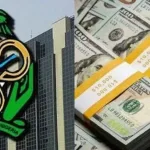Nigeria’s currency, the naira has continued to rise in value, trading at N1.382.95/$1 at the official market on Tuesday, 26 March 2024.
According to data published on the FMDQ Securities and Exchange platform, the naira recorded a gain of N25.09 or 1.78 per cent, compared to the previous day’s closing rate of N1,408 against the dollar.
Join our WhatsApp ChannelThe data also show that the foreign exchange trading witnessed an intraday high and low of N1,486 and N1,300 respectively against the dollar.
Daily forex turnover was $245.58 million on Tuesday, reflecting an increase of $23.43 million or 10.5 per cent from $222.15 million recorded on Monday.
At the parallel market, the story is the same as the cost of buying dollars dropped to N1,300 range.
Some Black market operators in Lagos who spoke to Prime Business Africa on Tuesday said they buy at N1,300 per dollar and sell at N1,400.
The Central Bank of Nigeria (CBN) has continued to implement measures to bring down the exchange rate which jumped very high some months after the naira was floated in the forex market.
In its bid to increase supply and boost liquidity in the forex market, the apex bank last month resumed sales of FX to Bureau de Change (BDCs). The first tranche of sales was $20,000 at N1,301/$. On Monday, it announced another round of sales of $10,000 to each eligible BDC operator at N1,251/$1 with a mandate to sell with a spread of not more than 1.5 percent of the purchase price.
Despite the declaration that the forex market in the country now operates on the principle of “willing buyer to willing seller” experts have hailed this CBN’s intervention saying it would help to significantly rein in the activities of speculators that impact on the value of the local currency.
The apex bank is also resolute in its determination to tame the surging tide of inflation which has reached an almost three-decade high of 31.7 per cent as of February 2024.
Prime Business Africa reports that the CBN had on Tuesday at its 294th Monetary Policy Committee (MPC), raised Monetary Policy Rate (MPR) by 200 basis points to 24.75 per cent from 22.75 per cent previously.
This would mean an increase in bank lending rates to discourage borrowing and also reduce money supply in the economy. While some analysts express misgivings with this CBN’s monetary policy tightening measure, others express optimism that it would, in combination with other fiscal measures, help bring down inflation.
Victor Ezeja is a passionate journalist with six years of experience writing on economy, politics and energy. He holds a Masters degree in Mass Communication.

















Follow Us